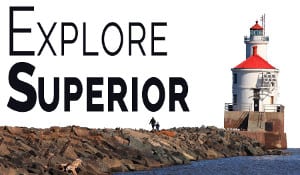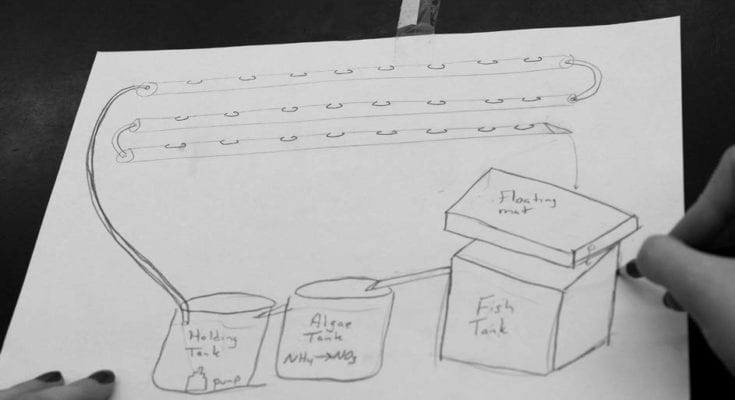Science Wing Goes Green With Fish Farm
By Madison Newman

The final concept for the aquaponics setup designed by the students in Mr. Conley’s AP Biology class are shown. The students are planning on building a fully functioning version that will yield fresh vegetables using fish excrement. Photo by Madison Newman
If things start to smell a little fishy in the halls in the coming months, administrators will know where to look. The Advanced Placement Biology class is developing an aquaponics setup in their classroom. Aquaponics is a system of agriculture with the goal of using the waste products of fish as fertilizer to grow plants in water, which in turn purifies the water.
AP Biology teacher Pete Conley originally learned about aquaponics from Hayward High School, which has a setup sponsored by the Department of Natural Resources at their school.
“The best thing about it is it’s environmentally friendly and it’s self-sustaining,” Conley said.
To get an idea of how an aquaponics setup works, Conley and fellow science teacher, Tyler Ross, who is helping design the setup, visited Victus Farm, a full-scale aquaponics farm. The farm was started in conjunction with the University of Minnesota- Duluth and the city of Silver Bay, with the goal of using aquaponics as a way to produce food, energy and jobs.
Conley then started working with his AP Biology class to develop their own aquaponics system. Senior Evan Larson has been working with three other classmates to draw up a possible design for their system, using the ideas Conley got from visiting Victus Farms.
“It’s a pretty fragile ecosystem that all needs to work together and so we needed to do research on what other people did for their aquaponics setups,” Larson said.
What makes aquaponics so fragile is that everything in the system must work together to become self-sustaining or able to reproduce on its own. Larson and his classmates researched what type of fish and plants would work in tandem, eventually deciding on using panfish for their adaptability, along with a variety of herbs.
“I took AP Chemistry last year, and I used a lot of that to learn how the fish will react with pH of the water and how much biomass of fish we need, along with how many plants we need to keep up with the amount of toxins the fish are releasing,” Larson said.
Setting up an aquaponics system is proving to be an exercise in patience for the students. The tank that will house the setup needs an entire month to acclimate and accumulate enough bacteria to break down the fish excrement in order for the plants to absorb the nitrates.
“It takes a little while to get set up, but once you do there is something called steady state, where there is just the right amount of everything happening to keep the cycle going,” Ross said.
If everything goes according to plan, Conley hopes to have the setup running in two to three months. He is currently applying for a permit from the DNR to restock a local pond in the summer with the fish they use in their system. While getting an aquaponics setup started is proving to be a challenge, those involved are looking to the future and the benefits the setup brings.
“It’s renewable, it’s local, it’s fresh. There’s a lot of good things it has going for it,” Ross said.




